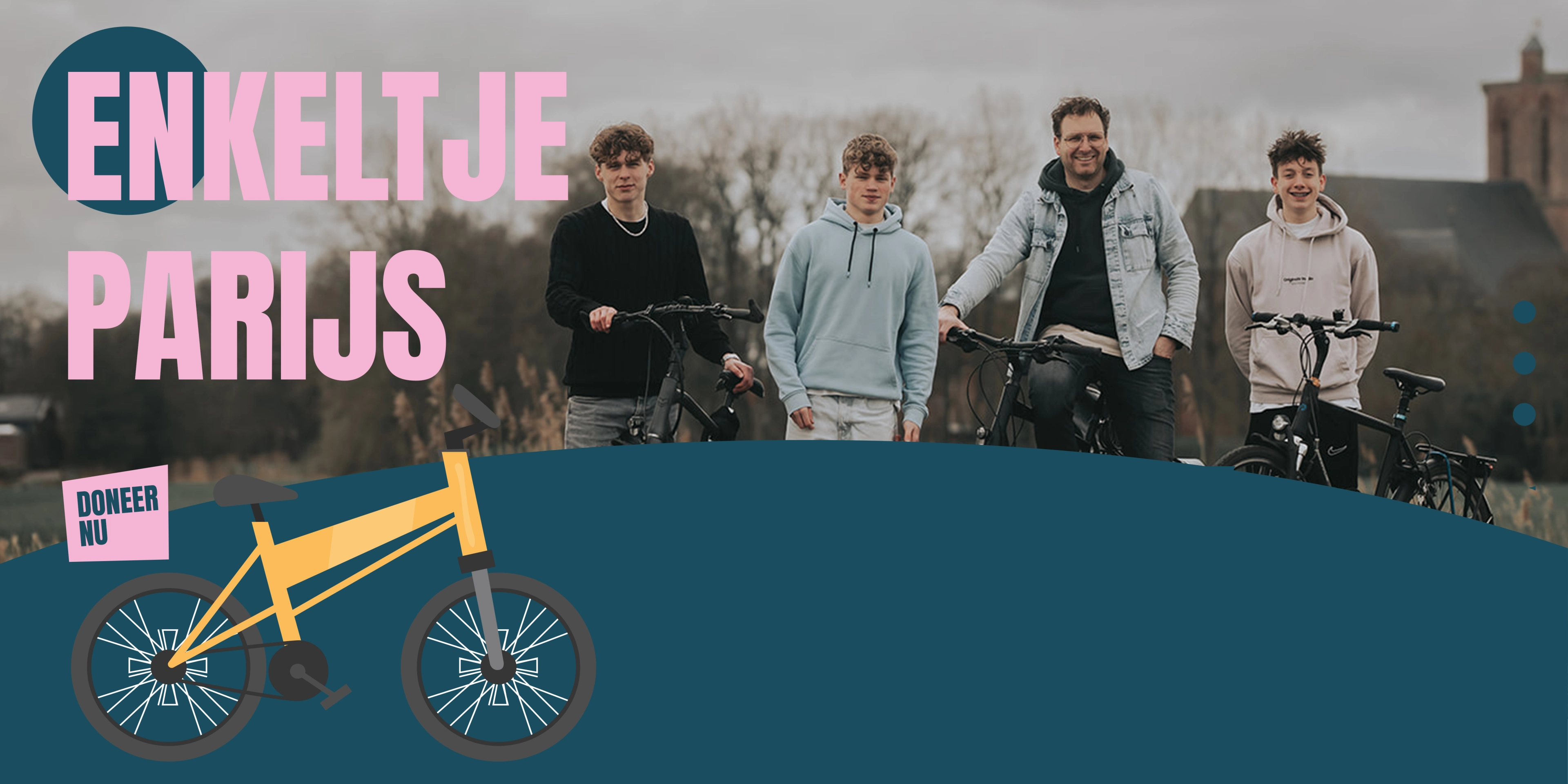Select your language

Support One Way To Paris and inspire others to take action.
To raise awareness, Thomas, Kiet, Jaimy, and Robert are cycling from Elburg to Paris in seven days.
Read more and donate (Page is only available in Dutch)!

Support One Way To Paris and inspire others to take action.
To raise awareness, Thomas, Kiet, Jaimy, and Robert are cycling from Elburg to Paris in seven days.
Read more and donate (Page is only available in Dutch)!

| Minimum time required: | 90 minutes of team preparation and 2 lesson hours |
| Length of One Way To Paris: | 34 minutes |
| Purpose of this lesson package: | Young people experience talking about mental health as normal and feel more comfortable addressing the topic. They become more aware of the importance of support and can name concrete ways to help others. They learn to openly and honestly share their thoughts and feelings about mental health in a safe environment. |
Minimale tijdsinspanning:
90 minuten voorbereiding in je team en 2 (les)uren met jongeren
Duur Enkeltje Parijs:
34 minuten
Doel van het lespakket:
Jongeren ervaren het praten over mentale gezondheid als normaal en voelen zich comfortabeler om dit onderwerp bespreekbaar te maken.
Jongeren worden zich bewuster van het belang van steun en kunnen concrete manieren benoemen om anderen te helpen.
Jongeren leren in een veilige setting open en eerlijk hun gedachten en gevoelens over mentale gezondheid te delen.
This is the lesson package for One Way To Paris. It provides a detailed guide on how you - as a teacher, mentor, coach, trainer, youth worker, group leader, or parent - can initiate conversations with children or young people. One Way To Paris offers various entry points to explore different themes. The story follows Meike, who is dealing with loneliness and loss. With this film, we aim to create space to talk about what you need to feel seen, and what it takes to love yourself. What can you do when people aren’t there for you, even though you hoped they would be? How do you deal with stress, rejection, and grief?
Why follow the steps?
To effectively implement One Way To Paris, a good preparation is essential. That’s why we’ve developed a structured lesson package to guide you through each step. It’s important to go through them carefully to ensure young people feel safe enough to open up. Sharing helps them connect with others and feel seen, which supports themes like loneliness and helps normalize conversations about not feeling okay.
Who is this film suitable for?
We recommend using One Way To Paris from the second year of secondary school (around age 13). At this age, you can start conversations preventively, and the themes will be recognizable. Older students (age 16/17) can also watch the film, though discussions may take on a different tone. For first-year students (around age 12), we advise using the film only with a clear reason. Younger teens may feel less secure about opening up. If there’s a clear need - like a recent event or concern among students - it can definitely be used.
Tailor the lesson to your group
As a teacher, mentor, coach, trainer, youth worker, group leader, or parent, you know best what your group needs. Based on year group, skill level, and class dynamics, you can decide how to apply the lesson materials. We trust your judgment. We've created a uniform lesson package and aim to provide tools for meaningful conversations. Familiarize yourself with the materials so you feel confident leading the discussion. This helps create a safe environment where young people feel free to speak openly about their mental health. Research shows that one in three young people struggles with mental health issues, and it’s always valuable to start that conversation.
STEP 1
Prepare the lessons thoroughly with your team. Review the package together and align your approach.
STEP 2
Inform parents before starting the lesson package. Download the sample letter and email it to parents.
STEP 3
Use one lesson hour to prepare the class or group to watch One Way To Paris. This will help you assess how safe it is to discuss mental health in your group.
STEP 4
Watch the film with your class or group and discuss it using the reflection worksheet. Depending on your students, you can decide how to approach the discussion questions.
STEP 5
Start an initiative with your class or group for someone in the community, such as elderly people or elementary school kids. Research shows that doing something positive for others improves mental health.
FOR INSPIRATION
One Way To Paris supports the Dutch organization The Forgotten Child. Launch an initiative for The Forgotten Child or expand your lesson with their teaching materials to make an even greater impact.
(Suitable for younger secondary students)
AFTERCARE
In the One Way To Paris community, you’ll find tools to support continued dialogue, such as podcasts, a chat line, and practical tips. There's also the option to talk with a youth worker for additional support.
Ensure that your digital equipment is properly configured. This will enable the class to get the most out of watching One Way To Paris. Watch One Way To Paris in advance on the laptop, iPad, tablet, or PC on which you will be playing it. This will prevent problems during streaming in class. Also check the sound and image quality in advance. Not every digital whiteboard is the same, and the color balance sometimes needs to be adjusted (too dark if, for example, the sun is shining on it. Make sure there is a curtain that can be closed or blinds).